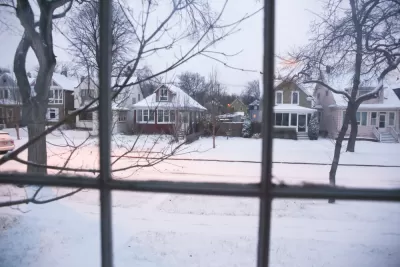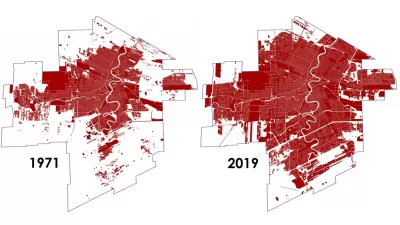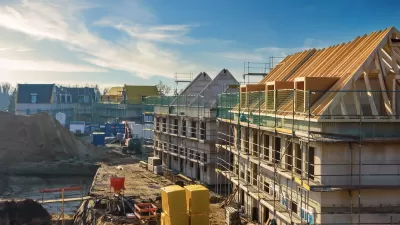Impact fess, also known as growth fees, are creating controversy in the Canadian city of Winnpeg, even as the city prepares new infill development guidelines to quell development controversies in older neighborhoods.

Bartley Kives reports from Winnipeg, where the city is wrestling with a desire to add more infill.
Kives traces the controversy back to 2016, when the city introduced impact fees, also known as growth fees. "The fees apply to new developments in some outlying neighbourhoods of Winnipeg," explains Kives. "Developers dislike them — a legal challenge against Winnipeg's authority to levy the charges is still winding its way through the courts at the speed of a large and heavily sedated sloth."
Winnipeg Mayor Brian Bowman has been a big supporter of impact fees, arguing that the city needs revenue to fund the infrastructure that supports the city's expansion. Still, the impact fees haven't generated any spending, despite raising $11 million, because of the ongoing court case.
A city plan to roll out the impact fees to older parts of the city, subject to infill development, also raises question about the goals of the fee program. "In theory, growth fees disincentivize urban sprawl — which is costly for cities — and make development in older neighbourhoods more attractive," explains Kives.
Taxing infill developments would spread the disincentive around. "To urban planning nerds, it may seem counterproductive to apply growth fees to infill development, which is the type of growth cities all over North America are trying to encourage."
There's at least one voice in power in the city who thinks infill projects are burdensome enough on the city's resources to warrant an impact fee, City council property chair Brian Mayes. "Mayes said he's not convinced infill pays for itself. On Friday, he said any increase in population results in greater stresses on Winnipeg's sewage-treatment system, for starters," reports Kives.
Set against that political backdrop, the city is also preparing new infill guidelines, designed to help new developments blend in to the existing urban fabric.
FULL STORY: What do we want? Infill housing! How do we get it? We have no idea!

Study: Maui’s Plan to Convert Vacation Rentals to Long-Term Housing Could Cause Nearly $1 Billion Economic Loss
The plan would reduce visitor accommodation by 25,% resulting in 1,900 jobs lost.

North Texas Transit Leaders Tout Benefits of TOD for Growing Region
At a summit focused on transit-oriented development, policymakers discussed how North Texas’ expanded light rail system can serve as a tool for economic growth.

Why Should We Subsidize Public Transportation?
Many public transit agencies face financial stress due to rising costs, declining fare revenue, and declining subsidies. Transit advocates must provide a strong business case for increasing public transit funding.

How Community Science Connects People, Parks, and Biodiversity
Community science engages people of all backgrounds in documenting local biodiversity, strengthening connections to nature, and contributing to global efforts like the City Nature Challenge to build a more inclusive and resilient future.

Alabama: Trump Terminates Settlements for Black Communities Harmed By Raw Sewage
Trump deemed the landmark civil rights agreement “illegal DEI and environmental justice policy.”

Dear Tesla Driver: “It’s not You, It’s Him.”
Amidst a booming bumper sticker industry, one writer offers solace to those asking, “Does this car make me look fascist?”
Urban Design for Planners 1: Software Tools
This six-course series explores essential urban design concepts using open source software and equips planners with the tools they need to participate fully in the urban design process.
Planning for Universal Design
Learn the tools for implementing Universal Design in planning regulations.
City of Santa Clarita
Ascent Environmental
Institute for Housing and Urban Development Studies (IHS)
City of Grandview
Harvard GSD Executive Education
Toledo-Lucas County Plan Commissions
Salt Lake City
NYU Wagner Graduate School of Public Service





























